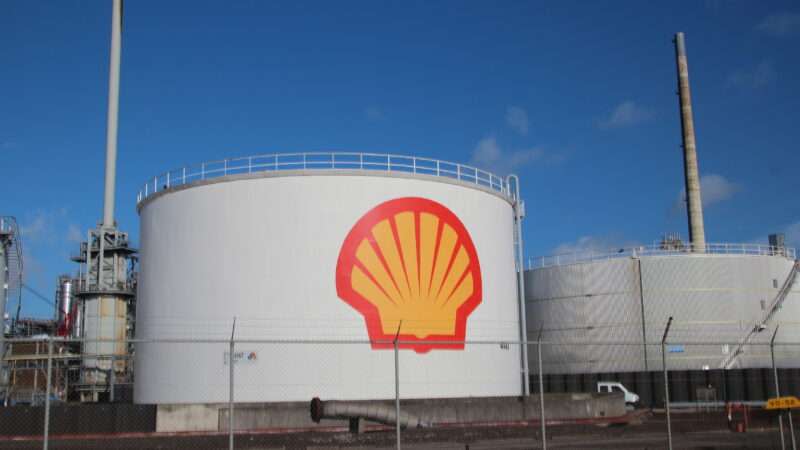Study Funded by Shell Convinced Pennsylvania To Give Shell $1.6 Billion Tax Break

In 2012, Pennsylvania lawmakers—including then-Gov. Tom Corbett, a Republican—crafted a proposal for Shell Oil Co. In exchange for tax incentives estimated to be worth as much as $66 million per year over 25 years—a total state investment of over $1.6 billion—plus a credit that would exempt the company from most, if not all, of its state and local taxes, Shell would build a polymer manufacturing plant in Beaver County, near Pittsburgh, instead of in Ohio or West Virginia. The plant, known as an "ethane cracker," would refine ethane, a natural gas, to produce single-use plastics.
While that's a huge investment from the state—and, by extension, from taxpayers—proponents said the project would more than pay for itself, generating millions of dollars in economic benefit that would create thousands of jobs. Two economic impact studies—each funded by Shell—backed up their claims.
But as it turns out, that optimism was misplaced, and the studies used to support the largest subsidy in Pennsylvania's history were themselves shoddy. That finding comes from a new report by the Ohio River Valley Institute (ORVI), a think tank located in the Appalachian region.
The original studies "were used to justify an 'investment' of billions of dollars in Shell's plan on the premise that the return-on-investment for taxpayers would be positive," wrote the authors of the ORVI report. "It is, unfortunately, unlikely to be so."
One study was conducted by professors at the Robert Morris University (RMU) School of Business in 2014, two years after the state approved the tax credits but before Shell purchased the site or began construction; the other study, conducted by some of the same professors, was released in 2021 as a follow-up.
The original study found, according to the ORVI report, that "the construction of the facility would bring millions of dollars in economic benefits to Beaver County." ORVI finds numerous issues with the methodology of the study, but it's worth noting that they didn't have access to it: "Correspondence with two of the RMU authors revealed that the study is the property of Shell and, thus, could not be shared with the authors of this report," they write. "The study was widely cited in media outlets in 2014, but does not appear online despite considerable search effort."
ORVI was only able to examine the original study because "some assumptions and findings in the 2014 report were used as the basis to support assumptions made in the second report," which is available online.
The ORVI report finds that RMU used "methodology that is not appropriate for long-term economic forecasting" and mischaracterized the type of plant that Shell was building, which "potentially led to unrealistically high estimates of economic benefits." The study also used a 40-year timeline to assess the project's benefits, which "implausibly assumes no global market shifts, no consumer attitude shifts around single-use plastics, no political and regulatory changes, and no need to re-invest capital for upkeep or modifications to the facility for four decades."
Further, RMU "completely omits consideration of the costs of billions of dollars in public subsidy" and ignores Shell's competitive economic advantage as a result of state incentives.
That's not all: "Hidden costs, including environmental degradation, chronic healthcare costs to residents due to air pollution, and declining home values near a large plastics plant, as well as the cost of what else could have been done with some of the subsidy money, are not considered. Nor does the study consider the offsetting impact of Shell's facility crowding out investment from other local businesses by driving up construction wages and material and land prices."
The facility finally opened in November 2022, more than a decade after the deal was struck. "Now, just over one year since production officially began, the plant has been mired in problems. The facility exceeded its allotted pollution limits within months of operating and repeated flaring has deepened air quality and health concerns of Beaver County residents," the report notes.
In May 2023, the state government found that since beginning operation, the factory had exceeded total emission limitations for gases including carbon monoxide, volatile organic compounds (VOCs), and hazardous air pollutants. Shell agreed to pay nearly $10 million in civil penalties; just two months earlier, the company had been approved to receive over $4.9 million in tax incentives for 2022.
"Furthermore," the report continues, "the plant seems to have fallen short so far in generating the economic benefits promised to residents, as Beaver County continues to trail the state across most economic metrics."
The plant's underperformance and pollution are troubling. But those troubles are exacerbated by the fact that the state chose to dole out billions of dollars in tax credits and abatements. Even more galling is the fact that the state apparently justified its expenditure on the basis of bad economic studies funded by the company set to receive the benefits.
The post Study Funded by Shell Convinced Pennsylvania To Give Shell $1.6 Billion Tax Break appeared first on Reason.com.

